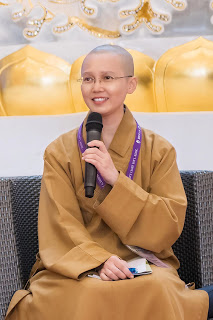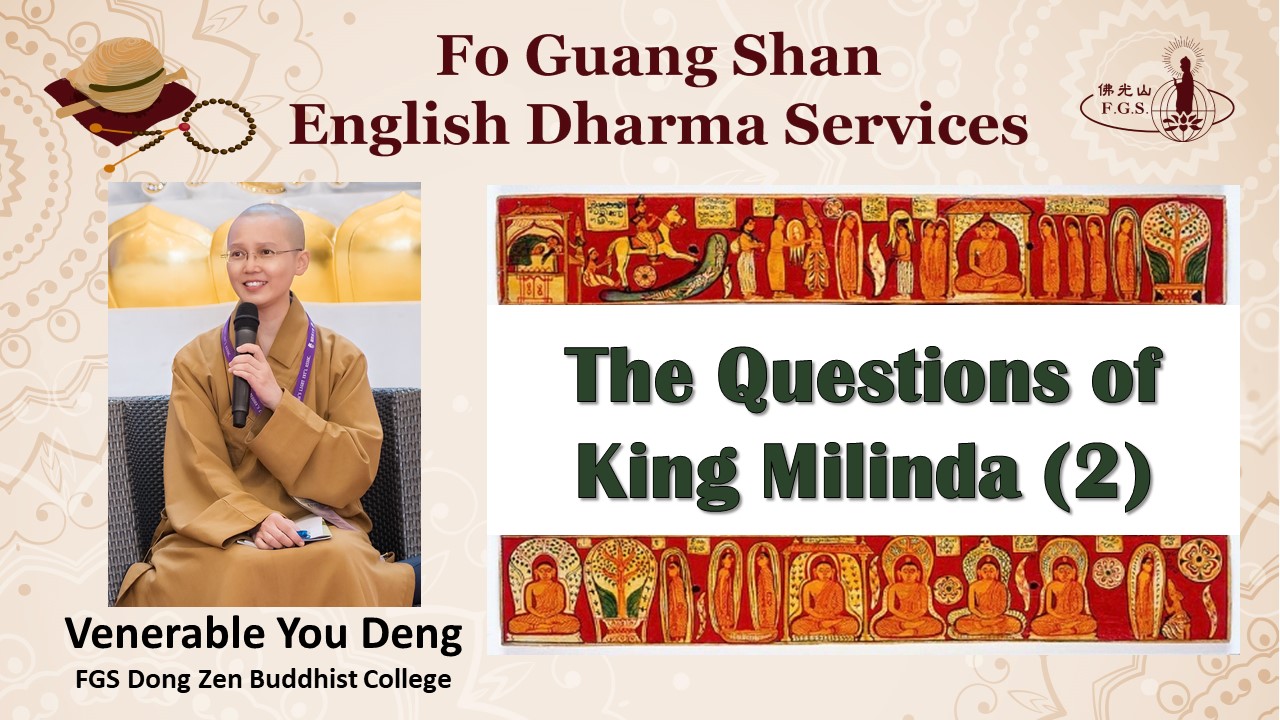
Speaker: Ven. You Deng
Fo Guang Shan Dong Zen Buddhist College, Malaysia
I. Introduction
Auspicious blessings to all dharma friends. Welcome to Fo Guang Shan English Dharma Services Channel. This is You Deng from Dong Zen Buddhist College Malaysia. To continue the topic from last week, “The Questions of King Milinda.” Last week, we walked through the brief background and related history of this sutra. Today, let’s start with the cast and setting.
These debates are found in the Bhiksu Nagasena Sutra in Chinese translation and the Milinda Panha in the Pali language. The debate between the king and the Buddhist monk mainly center in some of the important Buddhist concepts, such as: non-self, rebirth, karma, Buddha, nirvana, and spiritual life. The questions are still asked today by those who are interested in Buddhism but know little or no knowledge of the teaching. These questions suggested that the king has little knowledge of Buddhism but had difficulty understanding some major teachings, particularly the concept of non-self and rebirth.
As a result, Nagasena used as many as six similes to illustrate the point.
II. King Milinda and Bhikkhu Nagasena
Milinda was the King of Indo-Greek Kingdom. He was the most important of those Greek kings who continued in Bactria, the dominion founded by Alexander the Great. He probably reigned from about 155 to 130 BCE.
He was born in a Greek royal family and was a Brahmin in his past life. Milinda was very clever when he was young, he liked to read scriptures and learned scriptures, and he knew the scriptures of different ways. No one could beat him. Also, Milinda was established as the king, high talent and resourcefulness, clear knowledge of official affairs, mastery of tactics, ruled the country by righteous law, industry, commerce, and agriculture were very prosperous. Knows ninety-six kinds of heresy, and is especially good at debating. Later, due to the discussion with Bhikkhu Nagasena on issues related to Buddhist teachings, he converted to Buddhism as a result.
Bhikkhu Nagasena is from Central India, and in his past life he was an elephant king and a brahmin. When he was cultivating in the mountains in the past life, he became a good teacher with a Brahman. One vowed to be a king in the next life, and the other vowed to renounce the home to cultivate and attain the fruit of Arahatship. The one who vowed to be king was the later King Milinda; the one who vowed to become a monk and attained fruition was the later Bhikkhu Nagasena.
Their conversations not much more than 400 years after the Parinibbàna of the Buddha. This work was valued as one of the first recorded encounters between Hellenistic and Buddhist thought and culture. There are 76 dialogues in the Chinese translation and 87 dialogues in the Pali version.
I will share Venerable Master Hsing Yun’s picks for these English Dharma Services sessions.
III. The Question on Neither One nor the Other
King Milinda asked, “Reverend Nagasena, are you who uprise the same or are you another?”
“Neither the same nor another. What do you think about this, my king? Now that you are grown up, are you the same as when you were a boy, young, tender, lying on your back?”
“No, reverend sir, that boy, young, tender, lying on his back was one thing. I, who am now fully-grown, am another.”
“It is one ‘I’ that was the boy, young, tender, lying on his back, and it is the same ‘I’ that is now fully-grown. All these are held together as a unity in dependence on this body itself. Even so, my king, a continuity of phenomena is linked together. It uprises as one and ceases as another, and linked together as though there were no before and no after. Hence, it is neither the same nor another. But, the subsequence consciousness is get together with the preceding consciousness.”
IV. The Question on Rebirth
The king asked again, “Is there anyone who after death is not to be reborn again?”
Nagasena answered, “Some are to be reborn again, and some are not.”
“Who will be reborn? Who will not be reborn?”
“Those who have lustful desire or craving will be reborn again hereafter, and those who do not have lustful desire will not be reborn.”
“Excellent, Nagasena.”
V. The Question on Exertion
The king said, “Revered Sir, Nagasena, what is the characteristic of perseverance?”
Nagasena replied, “To hold fast to good qualities. To support good qualities is the characteristic mark of perseverance. It is just like the support given by a post to a wall that is going to collapse, or to a house that is going to fall. This is called perseverance.
“It is as if a king who sends out his army to fight (with the opposing army), but finds his army too weak to fight. So the king sends out his reinforcements to help (the weak army). As a result, the king wins the battle.
“If a person has bad qualities, he or she is just like the small and weak army. People eliminate all bad qualities by the support of the good qualities, just as the king wins the battle by the help of the reinforcements. With the help of the five good qualities, one destroys the five bad qualities. It is just like the king who sends reinforcements to the weak army. This is called supporting good qualities by exertion.”
VI. The Question on Wisdom
The king asked, “What is the characteristic mark of wisdom?” Nagasena said, “I have already told you before, if a person has wisdom, he can cut off all the doubts, and can distinguish what is meritorious. This is wisdom.”
Nagasena gave a simile, “It is like a person entering a dark room with light in hand, as soon as the light enters the room, the darkness disappears. So a person is endowed with wisdom, it is like a bright light. The person who is endowed with wisdom can cut off all evils, just like a person who cuts down the trees with a sharp knife. For worldlings, wisdom is of prime importance. A man endowed with wisdom is able to transcend the suffering of birth and death.”
“Excellent, Nagasena,” the king said.
VII. The Question on the Difference of Men due to Karma
The king asked again. “In this world, all men are complete with head, hair, skin, face, eyes, ears, mouth, nose, body, and the four limbs of arms and legs. But why among them some are long-lived, others are short-lived. Some have many diseases, others have few diseases. Some are poor, other are rich ; some are noble, others are mean; some are from large families, others are from small families. Some are handsome, others are ugly; some enjoy the confidence of others, others are suspected. Some are intelligent, others are stupid. Why are they not the same?”
Nagasena replied, “It is just like the fruits of the same kind of trees. Some are bitter, some are tangy, some are sweet, some are really sour. Why are they different since all are produced from the same kind of trees?” Nagasena asked the king.
The king replied, “They are different because they are sitting are different. It is just the same with regard to men, because each person thinks differently in his mind. So, people in this world have various differences.”
Then Nagasena said, “That is why the Buddha says, in accordance with one’s own good and bad actions, one will reap the result. Among them, some are rich, others are poor. All are due to their actions, good and bad done in the past, they will reap the result respectively according to their virtue.
“Excellent, excellent, Nagasena.” King Milinda is very satisfied with the answers by the Nagasena.
VIII. Conclusion
Thank you for listening for this session. Let us join our palms and redirect the joy and merits from this session, to all sentient beings, may all be well and happy.
Once again, thank you for joining us. If you find this Dharma service is helpful to your practice, please subscribe to the Fo Guang Shan English Dharma Services Youtube channel and share it to your friends.
Last but not least, I wish you all stay safe, stay healthy, and stay awesome. See you next week. Omitofo.

